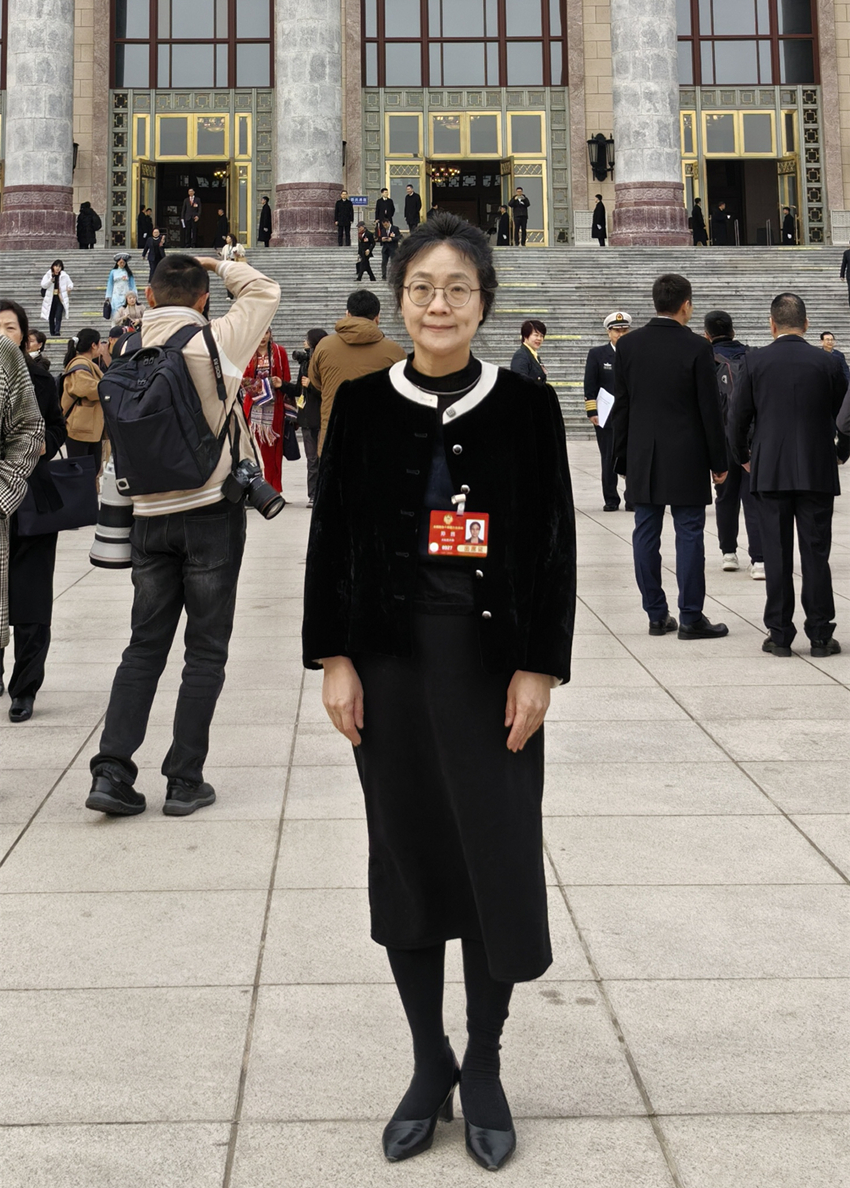
 0 Comment(s)
0 Comment(s) Print
Print E-mail China.org.cn, March 11, 2025
E-mail China.org.cn, March 11, 2025
A national political advisor has proposed focusing on the development of memory resources and strengthening the safeguarding of China's collective memory.

Zheng Qian, a member of the 14th CPPCC National Committee and deputy curator of the Chinese National Museum of Ethnology, poses for a photo during the annual session of the top political advisory body, Beijing, March 9, 2025. [Photo/China.org.cn]
Zheng Qian, a member of the 14th National Committee of the Chinese People's Political Consultative Conference (CPPCC) and deputy curator of the Chinese National Museum of Ethnology, pointed out that memory is a unique resource. It encompasses both historical information and contemporary, living collective memories and embodied experiences, forming a significant vehicle of historical preservation alongside cultural relics and documents.
"The collection, preservation and utilization of memories — transforming them into shareable and inheritable cultural resources — is hugely important for fostering national identity and consolidating communal consciousness," she said. "It is for this reason that the utilization of memory resources has become a cultural matter of international concern, as exemplified by UNESCO's 'Memory of the World Programme.'"
Several cultural institutions in China have already begun actively carrying out memory preservation efforts. For instance, the China Memory Project Center at the National Library has been engaged in the collection and preservation of memories for over a decade, achieving significant results.
However, Zheng expressed concern over insufficient efforts in rescuing and recording memory resources. The construction of memory resource databases in China remains weak, and many key witnesses have passed away before their memories could be collected, resulting in the loss of precious historical resources. Additionally, the lack of unified standards has led to materials becoming scattered across institutions with varying degrees of preservation and security, preventing the formation of a cohesive database and hindering the transformation from individual to collective memory.
She also noted that some neighboring countries have begun memory resource collection involving cross-border ethnic groups and minorities with shared cultural backgrounds, creating international competition that could impact China's cultural security.
As such, the political advisor suggested strengthening top-level design and policy support for memory resource development by establishing and improving mechanisms to rescue and preserve memory resources, clarifying their scope and responsible entities, and creating a unified database to integrate scattered resources — such as the China Memory Project and local oral histories — for joint data development and sharing.
Zheng proposed that the Publicity Department of the Communist Party of China (CPC) Central Committee, alongside the Ministry of Culture and Tourism and other departments, formulate a China Memory Center Construction Plan and include it in the 15th Five-Year Plan. She called for the establishment of a China Memory Center to integrate the scattered memory resources, fostering the collective memory of the Chinese nation, and developing standards for memory resource collection and use, clarifying participants' rights, obligations and ethical guidelines.
She emphasized the establishment of key rescue projects, such as memory resource initiatives focused on national unity and ethnic solidarity, including the collection of oral histories and contemporary stories highlighting interaction and integration among various ethnic groups. She also proposed creating special projects, such as city memory plans and social hotspot programs, to build a dynamic memory database.
To advance these memory preservation efforts, Zheng also suggested enhancing academic research and talent cultivation through collaboration with libraries, museums, archives and universities, while increasing the transformation of memory resources by building service and promotional platforms to boost public participation.
She believes this initiative can actively promote the multi-dimensional international dissemination of China's image. "We can fully utilize the collective memory resources of the Chinese nation, conduct in-depth research and interpretation, align Chinese memory resources with international standards, support the global outreach of Chinese culture, and present China's image through multiple channels and dimensions worldwide, effectively telling China's stories," she said.